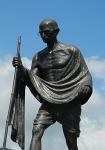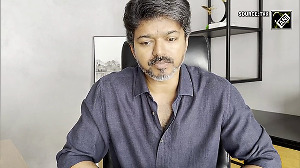China on Sunday declared a 'people's war' to crush the most virulent monk-led protests against its rule in Tibet in two decades that has brought Beijing under scanner ahead of the Beijing Olympics as troops kept a tight vigil in the riot-scarred capital city of Lhasa.
No fresh outbreak of violence was reported by authorities in Lhasa, which came under the vice-like grip of security forces after Friday's orgy of violence saw marauding mobs torching buildings and police and private vehicles, and loot banks and shops.
However, spontaneous demonstrations continued elsewhere in China with at least three Tibetan protesters killed in clashes in a Tibetan-populated district of Sichuan province in southwest China, rights groups said.
Officials claimed at least 10 civilians had died, mostly of burns, and 12 security personnel were injured in the violence two days ago.
Demanding an international probe into the Chinese crackdown, top Tibetan spiritual leader, the Dalai Lama, accused Beijing of carrying out a 'cultural genocide' and claimed that the death toll may be as high as 100. But he said he still supported Beijing's staging of the Olympics in August.
A day after setting a Monday deadline for rioters to surrender or face punishment, Tibetan political and security chiefs vowed to 'expose' the Dalai Lama group.
"We must wage a people's war to expose and condemn the malicious acts of these hostile forces and expose the hideous face of the Dalai Lama group to the light of day," they were quoted as saying by media after an emergency meeting.
Charred wreckages were strewn around in some streets in the Old Town, where most shops still remained closed, bearing testimony to the unrest that is reverberating world wide. Authorities have mobilised troops and officials in steps to clear the roads.
"The social order of the once riot site will be gradually restored," a regional government official said. Xinhua said the rioters had torched buildings for civilian use at 160 places.
As tension simmered, the city Mayor Doje Cezhug proclaimed, 'Lhasa is calm'.
"We did not enforce martial law there, and the situation in Tibet as a whole is good at present," he said, blaming the unrest on a 'handful' of monks and lawless persons engaged in 'beating, smashing, looting and burning'.
Many shops reopened and private cars and taxis are back on the streets, official Xinhua news agency said quoting its reporters in Lhasa.
"Grocery stalls and shops in my neighbourhood are still open," it quoted a Tibetan ethnic woman, Yangzom, as saying.
"Shops open for the day now and close during the night," a private gas owner Wang said.
Xinhua reported that two of the 12 security personnel injured were in 'critical' condition. "The protesters were barbarous and violent. They ganged up on the young and police officers and beat innocent people," a tourist surnamed Dong staying at a hotel on Bargor Street, a major area hit by the violence, was quoted as saying.
A Lhasa resident named Han Jingshan said, "Some of the officers were hit hard by the riot and were bleeding badly."China came under stepped up international pressure to show restraint in handling the protests that convulsed Tibet at a time when Beijing is going all out to showcase China through the Olympics' eyes.
US Secretary of State Condoleezza Rice, in a statement, urged the Chinese government to exercise restraint in dealing with the protests and expressed concern over reports of a 'sharply increased' police and military presence in and around Lhasa.
European nations, Australia and China's close neighbour Japan have also voiced concern.
Streets protests continued in several parts of the world as part of the stir launched to mark the 49th anniversary of the failed Tibetan uprising against the 57-year Chinese rule in the Himalayan region.
About 100 Tibetan exiles in Japan ran through a central Tokyo park relaying a parallel Olympic torch or 'Tibetan Olympics' torch while shouting 'Free Tibet' and 'China, get out'.
In the US, several people, including five police officers, were injured when a protest against suppression of Tibetans in Lhasa outside the Chinese Consulate in mid town Manhattan turned violent.
Protesters carrying red, blue and yellow flags clashed with police when they tried to barge in the consulate complex on Saturday. Police said that many people were arrested but did not reveal the number.
A rattled China whipped up its campaign against the 'Dalai clique', whom the Tibetan government has accused of having 'masterminded' the riots, roping in key religious figures in the Himalayan region.
The 11th Panchen Lama Gyaincain Norbu condemned the riots, saying 'sabotage acts' ran counter to the Buddhism tenets and pledged support to the ruling Communist Party of China and the government to ensure the safety and stability.
"The rioters' acts not only harmed the interests of the nation and the people, but also violated the aim of Buddhism," 18-year old Panchen, the second highest figure in Tibetan Buddhism, said.





